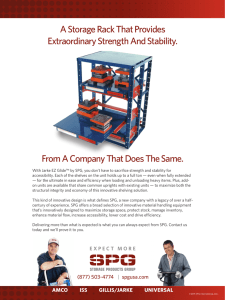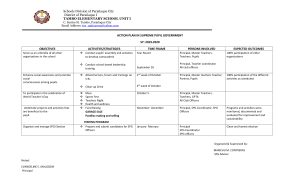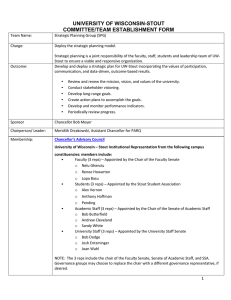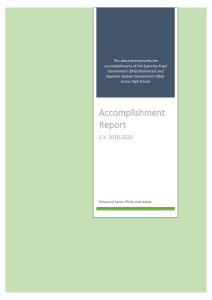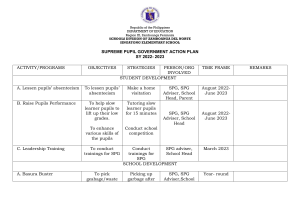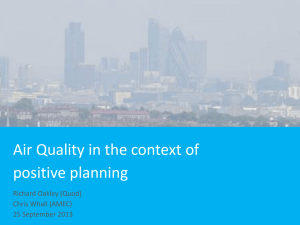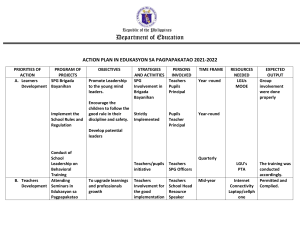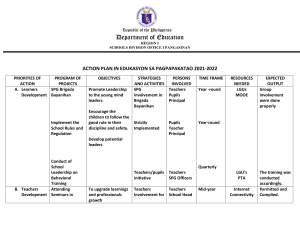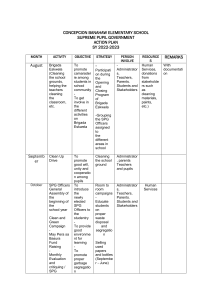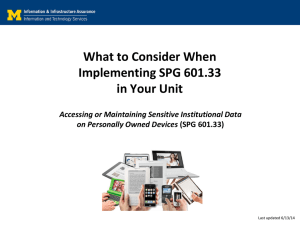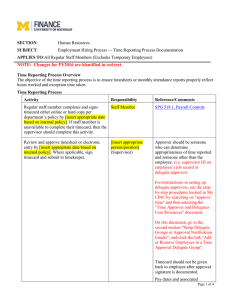Continuous Improvement Launch
advertisement
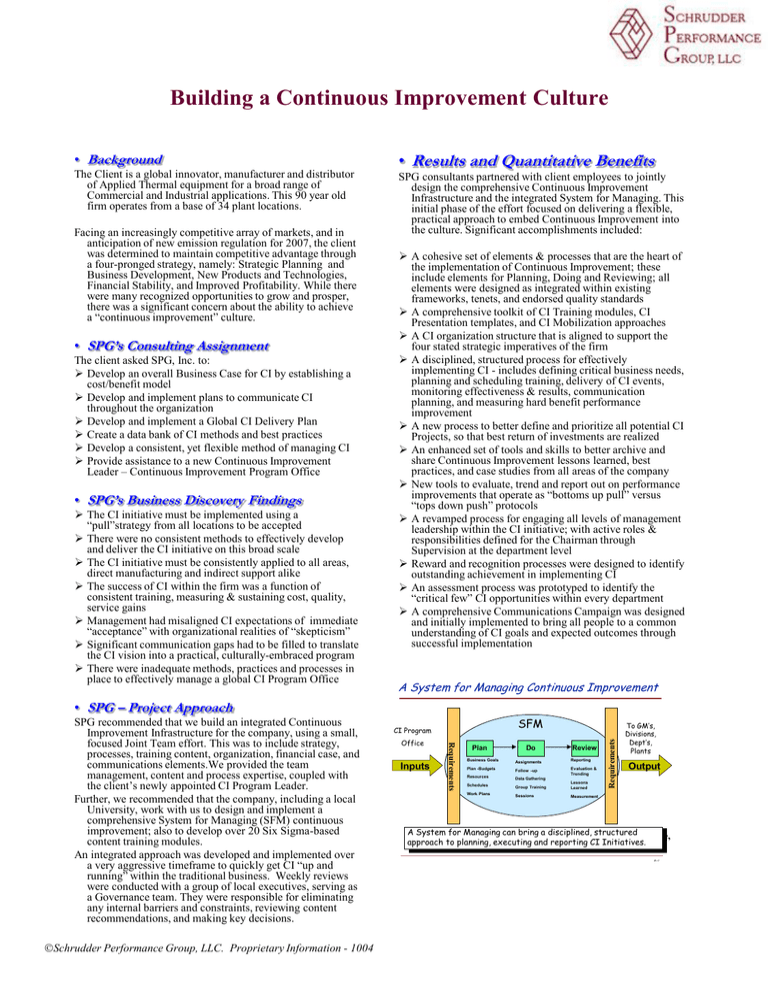
Building a Continuous Improvement Culture The Client is a global innovator, manufacturer and distributor of Applied Thermal equipment for a broad range of Commercial and Industrial applications. This 90 year old firm operates from a base of 34 plant locations. Facing an increasingly competitive array of markets, and in anticipation of new emission regulation for 2007, the client was determined to maintain competitive advantage through a four-pronged strategy, namely: Strategic Planning and Business Development, New Products and Technologies, Financial Stability, and Improved Profitability. While there were many recognized opportunities to grow and prosper, there was a significant concern about the ability to achieve a “continuous improvement” culture. • SPG’s Consulting Assignment The client asked SPG, Inc. to: Develop an overall Business Case for CI by establishing a cost/benefit model Develop and implement plans to communicate CI throughout the organization Develop and implement a Global CI Delivery Plan Create a data bank of CI methods and best practices Develop a consistent, yet flexible method of managing CI Provide assistance to a new Continuous Improvement Leader – Continuous Improvement Program Office • SPG’s Business Discovery Findings The CI initiative must be implemented using a “pull”strategy from all locations to be accepted There were no consistent methods to effectively develop and deliver the CI initiative on this broad scale The CI initiative must be consistently applied to all areas, direct manufacturing and indirect support alike The success of CI within the firm was a function of consistent training, measuring & sustaining cost, quality, service gains Management had misaligned CI expectations of immediate “acceptance” with organizational realities of “skepticism” Significant communication gaps had to be filled to translate the CI vision into a practical, culturally-embraced program There were inadequate methods, practices and processes in place to effectively manage a global CI Program Office • Results and Quantitative Benefits SPG consultants partnered with client employees to jointly design the comprehensive Continuous Improvement Infrastructure and the integrated System for Managing. This initial phase of the effort focused on delivering a flexible, practical approach to embed Continuous Improvement into the culture. Significant accomplishments included: A cohesive set of elements & processes that are the heart of the implementation of Continuous Improvement; these include elements for Planning, Doing and Reviewing; all elements were designed as integrated within existing frameworks, tenets, and endorsed quality standards A comprehensive toolkit of CI Training modules, CI Presentation templates, and CI Mobilization approaches A CI organization structure that is aligned to support the four stated strategic imperatives of the firm A disciplined, structured process for effectively implementing CI - includes defining critical business needs, planning and scheduling training, delivery of CI events, monitoring effectiveness & results, communication planning, and measuring hard benefit performance improvement A new process to better define and prioritize all potential CI Projects, so that best return of investments are realized An enhanced set of tools and skills to better archive and share Continuous Improvement lessons learned, best practices, and case studies from all areas of the company New tools to evaluate, trend and report out on performance improvements that operate as “bottoms up pull” versus “tops down push” protocols A revamped process for engaging all levels of management leadership within the CI initiative; with active roles & responsibilities defined for the Chairman through Supervision at the department level Reward and recognition processes were designed to identify outstanding achievement in implementing CI An assessment process was prototyped to identify the “critical few” CI opportunities within every department A comprehensive Communications Campaign was designed and initially implemented to bring all people to a common understanding of CI goals and expected outcomes through successful implementation A System for Managing Continuous Improvement • SPG – Project Approach Schrudder Performance Group, LLC. Proprietary Information - 1004 SFM CI Program Office Inputs Requirements SPG recommended that we build an integrated Continuous Improvement Infrastructure for the company, using a small, focused Joint Team effort. This was to include strategy, processes, training content, organization, financial case, and communications elements.We provided the team management, content and process expertise, coupled with the client’s newly appointed CI Program Leader. Further, we recommended that the company, including a local University, work with us to design and implement a comprehensive System for Managing (SFM) continuous improvement; also to develop over 20 Six Sigma-based content training modules. An integrated approach was developed and implemented over a very aggressive timeframe to quickly get CI “up and running” within the traditional business. Weekly reviews were conducted with a group of local executives, serving as a Governance team. They were responsible for eliminating any internal barriers and constraints, reviewing content recommendations, and making key decisions. Plan Do Review Business Goals Assignments Reporting Plan -Budgets Follow -up Resources Evaluation & Trending Data Gathering Schedules Work Plans Group Training Lessons Learned Sessions Measurement Requirements • Background To GM’s, Divisions, Dept’s, Plants Output AASystem for Managing can bringinsures a disciplined, structured work Management System availability of resource, approach to planning, executing and reporting CI Initiatives. and predictability in meeting customer requirements Rv 0
